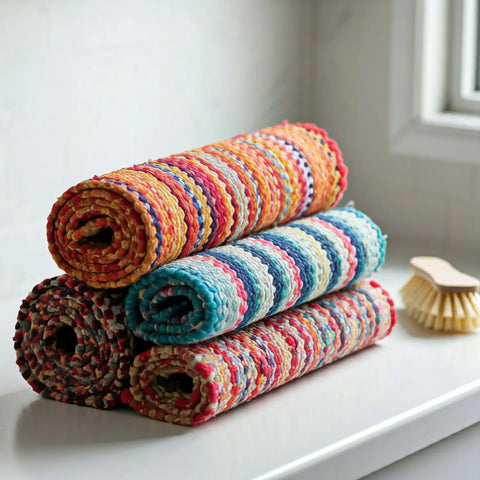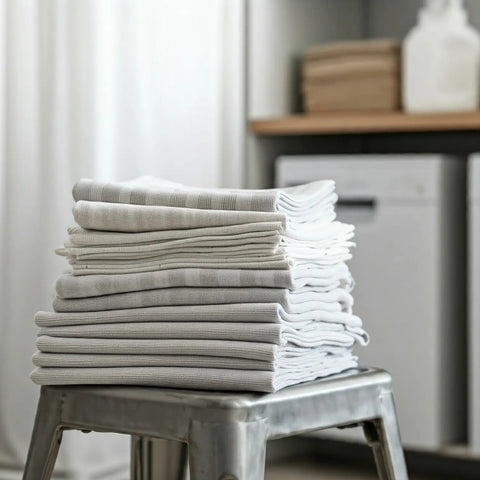
Care tips for home textiles
The importance of proper textile care – from durability to beauty
Home textiles, such as rugs, kitchen towels and handmade yarn products, are the pearls of everyday life at home. They bring warmth, color and a touch of nature to every home. In order for these beautiful and high-quality products to last, proper care is important. At the same time, we also affect our ecological footprint. Proper care not only extends the lifespan, but also helps keep the colors and materials of textiles beautiful, so knowing how to wash and dry them is like an investment in the future.
Many people don't realize that the choice of washing temperature or detergent can make a big difference in the durability of a textile – or the well-being of the environment. For example, jute and wool, which are natural materials, can lose their shape or texture as a result of careless machine washing. At best, each wash can be like a mini-vacation for the textile – relaxing but carefully chosen.
Another good reason to invest in textile care is economic. By avoiding unnecessary wear and tear, we save both natural resources and our wallets.
Best of all? Well-maintained textiles make your home a more comfortable place, and the right care is surprisingly rewarding! So let's dive deeper into these tips and learn how to wash and care for textiles the right way – with a twinkle in your eye and respect for nature.

Rag rugs and their care
Rag rugs are durable and cozy textiles that benefit particularly well from traditional, ecological care methods. When it comes to washing, rag rugs are best friends with old-fashioned pine soap – a natural detergent that is particularly suitable for cleaning rugs without damaging the fibers. Combined with brushing, pine soap helps to remove dirt and stains effectively but gently, keeping the rug beautiful and usable for longer.
After washing, drying is an important step, and for rag rugs, flat drying is the best choice. Flat drying preserves the shape of the rug and prevents it from stretching, which can occur if the rug is hung to dry. By placing the rug to dry evenly, we ensure that the rug dries evenly and maintains its appearance. If the weather is favorable, outdoor drying also adds a fresh scent and effectively removes moisture.
Seasonal care: In the summer, when the sun and heat are at their strongest, it is an ideal time to wash your rugs outdoors. The rug can be thoroughly cleaned under the sun and dried in the fresh air, which helps keep it beautiful and fresh. In the winter, you can air out your rugs in the cold or freshen them up in the snow. A proper frost bath is an effective way to get rid of dust mites.

Cotton kitchen towels and dish towels
Cotton kitchen and dish towels are durable and easy to care for, as they are machine washable and can withstand even higher temperatures. Washing at 60 degrees helps remove bacteria and grease stains, making these towels perfect for everyday use in the kitchen.
Stain removal and everyday use: Common kitchen stains, such as oil and sauce, can be removed immediately by hand washing - a quick first aid is to moisten a towel with lukewarm water and rub a little dishwashing liquid into the stain. Leave the product to work for a few minutes and then rinse thoroughly. or wash the towel according to the instructions. This will prevent small stains from being absorbed into the fibers, and the towels will remain clean in daily use.
Stain Removal Tips: One of the most effective and natural ways to remove stubborn stains, like those left by carrots and blueberries, is the sun. Spread a clean but still stained towel out in direct sunlight to dry – the UV rays act as a natural bleach, fading stains without the use of chemicals.
Air drying is always a good choice for drying, but cotton towels can also withstand drying in the dryer, which is convenient if you want your towels to be extra soft.

Special care tips for delicate materials
Delicate yarn materials such as acrylic, mohair, merino wool, wool, cotton and silk blends require care. The appropriate washing and drying method for each material will help maintain the elasticity, structure and appearance of the yarn. Here are the instructions for each material:
Acrylic is machine washable at low temperatures. Drying at room temperature is recommended as high temperatures can stretch the fibers.- Washing: Machine wash 30–40 °C. Use a gentle spin cycle and prefer a gentle program.
- Drying: Flat drying is best, as acrylic can stretch when hung.
Mohair and Merino wool are delicate natural fibers. For these materials, hand washing in cool water with a mild detergent is the best way to maintain their softness. Avoid rubbing and twisting.
Mohair
- Washing: Hand wash in cool water; use a detergent specifically designed for wool.
- Drying: Gently squeeze out the water and lay flat to dry. Avoid sunlight.
Merino wool
- Washing: Hand or machine wash on a wool cycle (max 30°C). Use a mild detergent.
- Drying: Flat dry, do not hang. Protect from direct heat.
Wool and Cotton : Wool products benefit from a cool hand wash, while cotton can be machine washed at a slightly higher temperature. When drying, both retain their shape best by drying flat.
Villa
- Washing: Preferably by hand in cool water. If machine washed, use the wool wash program.
- Drying: Flat drying, avoid direct sunlight.
Cotton
- Washing: Machine wash 40–60 °C, resistant to most detergents.
- Drying: Air dry or tumble dry on low heat.
Silk blend : This material requires extra care. Hand washing in cool water is ideal, and you should be careful when rinsing. Avoid harsh rubbing to preserve the structure of the silk and other fibers.
- Washing: Hand wash in cool water. Use a mild detergent suitable for silk.
- Drying: Flat dry, no sunlight or wringing.

Ecological detergents for delicate materials: For delicate yarns, mild, ecological detergents that do not contain harsh chemicals are recommended. For example, wool detergents or natural soaps are ideal, as they preserve the softness and color of the fibers. Ecological alternatives are environmentally friendly and reduce the migration of microplastics and other chemicals into waterways - by caring for yarns properly, we extend the life cycle of both them and the environment.
The importance of ecology in textile care
Ecological textile care not only extends the life of products but also reduces their environmental impact. When we wash and dry textiles correctly, we save water, energy and reduce the release of microplastics and chemicals into the environment. We avoid excessively long washing programs and high temperatures, which consume both fibers and natural resources.
Ecological detergents, which are biodegradable and made from natural raw materials, are another important factor. They clean effectively but gently, reducing the amount of chemical residues ending up in waterways. Pine soap, for example, is a popular choice because it is a natural and safe substance that cleans effectively without negatively impacting the environment.
Everyday tips for busy people
In the hustle and bustle of everyday life, washing textiles doesn't have to be complicated. Here are some quick tips to save you time and effort without damaging the materials:
- Quick stain removal: Remove fresh stains immediately with lukewarm water and a small amount of mild detergent – this way they don't have time to set.
- Quick drying methods: Use an over-the-door or shower rod to dry towels instead of a clothesline when you're in a hurry.
- Cold water wash: Most textiles can be cleaned even in cold water, saving energy and reducing wear.

Frequently asked questions about textile care
1. Can I wash all textiles in the machine?
Most cotton and acrylic fabrics are machine washable, but more delicate fabrics such as mohair, merino wool and silk blends are recommended to be washed by hand. Always check the washing instructions.
2. Why is flat drying important?
Flat drying prevents textiles from stretching and retains their shape better than hanging, especially with rag rugs and wool products.
3. How can the sun help with stain removal?
The sun acts as a natural bleach and can fade stubborn stains, such as those left by carrots and blueberries.
4. What are the benefits of ecological detergents?
Ecological detergents are environmentally friendly and protect fibers, keeping textiles soft and beautiful without chemical residues.
